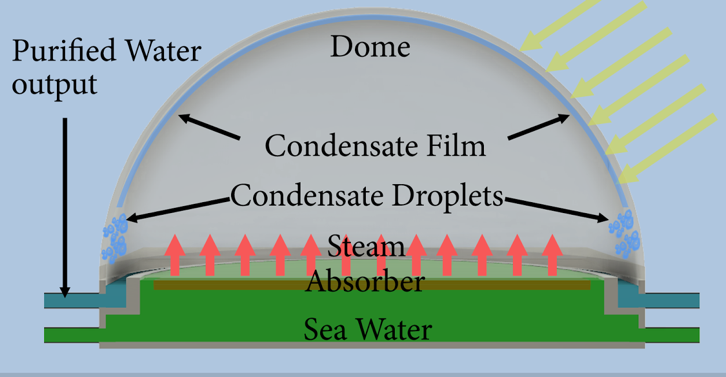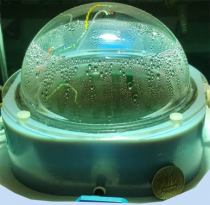The Pioneering Aquaneers
A Clean-Tech Company Gets Its Start at Tandon

“Everyone deserves clean water, but often those with the greatest need are the least able to afford it,” explains Joe Habib. An MIT-trained physicist and serial entrepreneur, Habib came to Brooklyn to co-found Aquaneers, an enterprise dedicated to developing advanced nanomaterials and new ways of harnessing solar energy.
He found excited collaborators at Tandon, where he joined forces with Professor of Chemical and Biomolecular Engineering Avi Ulman and Richard Day, a 2015 graduate who had studied chemical engineering.
The trio has developed a desalinator that uses the power of the sun to produce clean, potable water from seawater. “In Israel, since the 1950s they’ve been heating water using sunlight,” Ulman, who earned his doctoral degree from that country’s renowned Weizmann Institute, says. “And I have long thought about how solar could be used for water purification.”

A lab-scale prototype of the desalinator in operation
The answer can be found in their Plasmonic Ribbon, a photo-thermal material that when immersed in water converts sunlight directly into heated steam for highly efficient solar distillation. The 3D-printed body of their desalinator prototype, dubbed the AquaSol, was created in Tandon’s MakerSpace. It features a Plasmonic Ribbon absorber; a salt-water reservoir; and a clear dome, where the purified water collects as a condensate and is directed into a reservoir. The dome and the reservoirs are coated with a hydrophobic material to increase the yield of clean water and reduce contamination, with automated water level, temperature, and quality monitoring.
Their prospective market, they say, is enormous; desalination is projected to be a more than $50 billion market in 2020. Ulman, who serves as chief technology officer of the company, sees great potential in India. He explains that an estimated 10 percent of the world’s population has difficulty finding safe water and that water scarcity is inextricably linked to other societal problems.
The developing world is far from the only place in which they see their innovative desalinator proving vital. Any area hit by a natural disaster can be prone to water shortages, and Aquaneers’ potential customers include aid groups seeking efficient and cost-effective water-purification methods. The U.S. military, which currently spends up to $25 a gallon to get water to personnel out in the field, represents another market opportunity. Because the unit is modular, it provides an imminently scalable solution. Thus, a single unit might supply water for a small military unit, while linking several modules together could provide a clean water solution for a village and all its inhabitants.
The startup company has caught the attention of those at PowerBridgeNY, an initiative launched by the New York State Energy Research and Development Authority that seeks to shepherd clean energy innovations from university research labs to the marketplace. Aquaneers has been invited to submit a full proposal for PowerBridge funding and mentorship. The company has also won a Phase I grant from the U.S. Department of Energy (DOE), through its Small Business Innovation Research (SBIR) program, thanks to their new technology.
Habib, Ulman, and Day are grateful for the day-to-day support they are receiving from Tandon. “Many software companies can launch with just desk space and a laptop,” Habib says, “but for a technology like this, one needs a real lab and prototyping facilities.” That their affiliation with the school allows them to be in Brooklyn is another major plus. “The borough is at the epicenter of an exciting technology boom,” Ulman explains, “and Tandon is playing a large role in that.”




